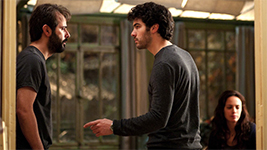The Past (Le passé) [Blu-Ray]
|
 The Past (Le passé), Iranian director Asghar Farhadi's follow-up to his Oscar-winning breakthrough A Separation (2011) and the first film he has made outside his native country, is another stunning drama that confirms his artistic preeminence in making films that are simultaneously intimate psychological portraits of interpersonal conflict and detailed, nerve-wracking mysteries. Farhadi's true gift as a storyteller is the way he intertwines the two, using the unfolding mystery and its attendant revelations to explore new depths and layers to his characters, which makes them all the more complex and memorable. Farhadi's humanism compels him to avoid simplistic judgments of right and wrong and instead focus on the myriad desires, fears, prejudices, hopes, and dreams that drive his characters to do what they do. We may not always agree with their actions, as the characters often act impulsively, irrationally, and with anger (justified or not), but we always understand why. Farhadi is a master of getting us inside the drama, tapping it directly into our nervous systems.
The Past (Le passé), Iranian director Asghar Farhadi's follow-up to his Oscar-winning breakthrough A Separation (2011) and the first film he has made outside his native country, is another stunning drama that confirms his artistic preeminence in making films that are simultaneously intimate psychological portraits of interpersonal conflict and detailed, nerve-wracking mysteries. Farhadi's true gift as a storyteller is the way he intertwines the two, using the unfolding mystery and its attendant revelations to explore new depths and layers to his characters, which makes them all the more complex and memorable. Farhadi's humanism compels him to avoid simplistic judgments of right and wrong and instead focus on the myriad desires, fears, prejudices, hopes, and dreams that drive his characters to do what they do. We may not always agree with their actions, as the characters often act impulsively, irrationally, and with anger (justified or not), but we always understand why. Farhadi is a master of getting us inside the drama, tapping it directly into our nervous systems.
Like A Separation, the story in The Past revolves around a separated couple, and again the film's fundamental philosophical and moral dilemma is how do we account for multiple, sometimes contradictory, layers of right and wrong? In this case, the couple is Ahmad (Ali Mosaffa), an Iranian man, and Marie (Bérénice Bejo), his French wife. When the film opens, Ahmad is returning to Paris for the first time since he broke up with Marie and went back to Tehran four years earlier. The reason for his return is to finalize their divorce, specifically because Marie is set to marry her boyfriend Samir (Tahar Rahim), a younger man who runs a dry cleaner and whose wife has been in a coma for eight months after a suicide attempt. Rather than booking him a hotel room, Marie has Ahmad stay at the house they used to share on the outskirts of Paris, which is now home to her and Samir and their collective children: Samir's young son Fouad (Elyes Aguis) and Marie's two daughters from an earlier marriage, teenage Lucie (Pauline Burlet) and elementary-aged Léa (Jeanne Jestin). Her motivations for this arrangement are murky at first, but as the story progresses, it becomes more and more clear that she has conflicted feelings about both Ahmad, her soon-to-be-ex-husband, and Samir, her soon-to-be-new-husband. Into this dramatic web Farhadi weaves numerous subplot threads, all of which tie together in ways that feel intimate and organic, but never in a Screenplay 101 kind of way (although he has professed to being an adamant follower of the techniques advocated by Syd Field). Marie has been having problems with Lucie, who has become increasingly rebellious and unmanageable, and she asks Ahmad to speak with her. In doing so, Ahmad uncovers a complex series of events involving the origins of Marie and Samir's relationship, Samir's wife's suicide, Lucie's animosity toward Samir, and Naïma (Sabrina Ouazani), an illegal who works at Samir's dry cleaner. Samir is also having trouble with Fouad, who looks to be six or seven and is angry about his mother being in coma, his father taking up with a new woman, and the lack of consistency he feels in his home life (although he and Samir now live with Marie, they still keep their apartment where they lived with Samir's wife). Many of the film's most emotionally powerful scenes involve Fouad, who is played by newcomer Elyes Aguis in a nuanced, compelling performance. Few directors have genuine mastery of child actors, and Farhadi may be the best since Francois Truffaut and Steven Spielberg. He draws from Aguis a delicately textured portrait of preadolescent anger, resentment, and confusion—much of which derives from the inconsistencies of the adults around him—that is utterly convincing and therefore utterly heartbreaking. The manner in which he holds his body taut and rigid, as if ready to flee at any moment, and the way he refuses to look at the adults confronting him or does so with furrowed brow and upraised eyes gets to the heart of a child's unique intertwining of resentment and fear of both the consequences of his acting out and the behaviors themselves. Bérénice Bejo (best know stateside for her charming turn as an ingénue in The Artist) may have won the Best Actress award at Cannes for her performance as Marie, a woman who is twisted inside and out with her own sense of confusion and guilt, but for me, Aguis delivers the film's best performance. In the end, Farhadi's aim is not to deliver pat answers, but rather to challenge us with potentially unresolvable interpersonal conundrums. Although he adheres to many of the tenets of classical narrative construction, he refuses to tie things up neatly, especially in the film's ironic and heart-rending final scene, which answers one question while opening up a host of others. Plotlines are resolved, but not in a way that is conventionally assuring, which encourages us to reflect on the nature of what has happened and how things might have turned out differently. Farhadi balances his intertwining narrative threads on a thin line between the conventional pleasures of solving a mystery and the more challenging issue's of life's inherent messiness, and his mastery of that perplexing tension has produced the year's best film.
Copyright ©2012 James Kendrick Thoughts? E-mail James Kendrick All images copyright © Sony Pictures Home Entertainment | |||||||||||||||||||||||||||||||||||
Overall Rating:



 (3.5)
(3.5)
Subscribe and Follow
Get a daily dose of Africa Leader news through our daily email, its complimentary and keeps you fully up to date with world and business news as well.
News RELEASES
Publish news of your business, community or sports group, personnel appointments, major event and more by submitting a news release to Africa Leader.
More Information
